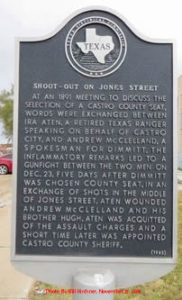This Includes the following cities/towns:
- Dimmitt – County Seat
- Hart
- Hilburn
- Nazareth
- Summerfield
- Sunnyside
Cemeteries
- Castro Memorial Cemetery – Dimmitt
- Flagg Cemetery – Dimmitt
- Hart Cemetery – Hart
- Westlawn Memorial Park – Dimmitt
Historical Landmarks
- Castro County Courthouse – County Seat
- Gilbreath-Cowsert House
- The J. W. Carter Family and the 7-Up Ranch
- P.O.W. Camp Chapel
- Quanah Parker Trail
- Shoot-Out on Jones Street
- Summerfield-Dameron Corner
Castro County Courthouse – County Seat
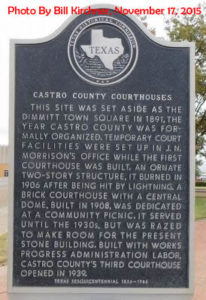
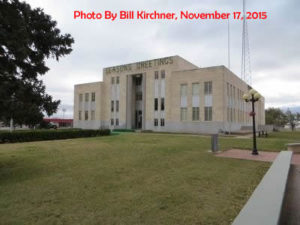 This site was set aside as the Dimmitt town square in 1891, the year Castro County was formally organized. Temporary court facilities were set up in J. N. Morrison’s office while the first courthouse was built. An ornate two-story structure, it burned in 1906 after being hit by lightning. A brick courthouse with a central dome, built in 1908, was dedicated at a community picnic. It served until the 1930s, but was razed to make room for the present stone building. Built with Works Progress Administration labor, Castro County’s third courthouse opened in 1939.
This site was set aside as the Dimmitt town square in 1891, the year Castro County was formally organized. Temporary court facilities were set up in J. N. Morrison’s office while the first courthouse was built. An ornate two-story structure, it burned in 1906 after being hit by lightning. A brick courthouse with a central dome, built in 1908, was dedicated at a community picnic. It served until the 1930s, but was razed to make room for the present stone building. Built with Works Progress Administration labor, Castro County’s third courthouse opened in 1939.
The Courthouse is located 34° 33.043′ N, 102° 18.736′ W. Marker is in Dimmitt, Texas, in Castro County. Marker is at the intersection of South Broadway and East Bedford Street, on the right when traveling north on South Broadway.
Gilbreath-Cowsert House
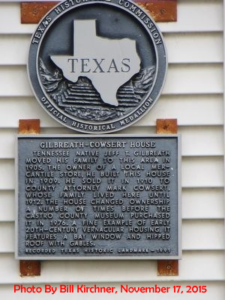
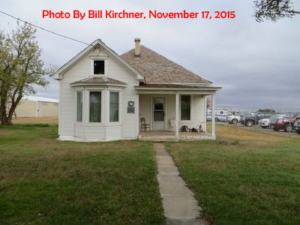 Tennessee native Jeff T. Gilbreath moved his family to this area in 1905. The owner of a local mercantile store, he built this house in 1909. He sold it in 1910 to county attorney Mark Cowsert, whose family lived here until 1912. The house changed ownership a number of times before the Castro County Museum purchased it in 1976. A fine example of early 20th century vernacular housing, it features a bay window and hipped roof with gables.
Tennessee native Jeff T. Gilbreath moved his family to this area in 1905. The owner of a local mercantile store, he built this house in 1909. He sold it in 1910 to county attorney Mark Cowsert, whose family lived here until 1912. The house changed ownership a number of times before the Castro County Museum purchased it in 1976. A fine example of early 20th century vernacular housing, it features a bay window and hipped roof with gables.
This is located 34° 33.352′ N, 102° 19.01′ W. Marker is in Dimmitt, Texas, in Castro County. Marker is on West Halsell Street west of Wheat Street, on the right when traveling west.
The J. W. Carter Family and the 7-Up Ranch
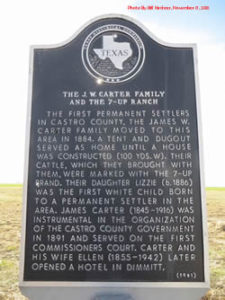
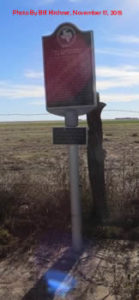 The first permanent settlers in Castro County, the James W. Carter family moved to this area in 1884. A tent and dugout served as home until a house was constructed (100 yds. W). Their cattle, which they brought with them, were marked with the 7-UP brand. Their daughter Lizzie (b. 1886) was the first white child born to a permanent settler in the area. James Carter (1845-1916) was instrumental in the organization of the Castro County government in 1891 and served on the first commissioners court. Carter and his wife Ellen (1855-1942) later opened a hotel in Dimmitt.
The first permanent settlers in Castro County, the James W. Carter family moved to this area in 1884. A tent and dugout served as home until a house was constructed (100 yds. W). Their cattle, which they brought with them, were marked with the 7-UP brand. Their daughter Lizzie (b. 1886) was the first white child born to a permanent settler in the area. James Carter (1845-1916) was instrumental in the organization of the Castro County government in 1891 and served on the first commissioners court. Carter and his wife Ellen (1855-1942) later opened a hotel in Dimmitt.
This marker is located 34° 23.022′ N, 102° 24.665′ W. Marker is near Dimmit, Texas, in Castro County. Marker is at the intersection of Farm to Market Road 146 and Farm to Market Road 1055, on the right when traveling east on Route 146.
Italian POW Camp
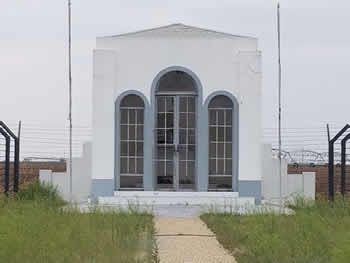
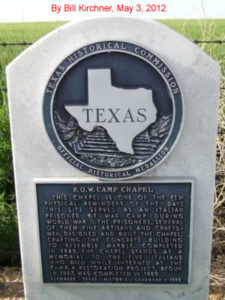 This chapel is locate about 3.5 miles south of Hereford Texas. From 1055 west on Deaf Smith County Road 1 one mile and south on county Road H about 500 yards.
This chapel is locate about 3.5 miles south of Hereford Texas. From 1055 west on Deaf Smith County Road 1 one mile and south on county Road H about 500 yards.
During World War II, Texas hosted 79 prisoner of war camps, one of which—located in Hereford—held over 5,000 Italian POWs captured in North Africa. The second largest such camp built in the US, the US Army Corp of Engineers oversaw the camp’s construction at a total cost of two million dollars. While imprisoned, POWs contributed to local agricultural industry in exchange for housing and meals provided at the camp. Five Italian POWs died and were buried on site before the war’s conclusion. Using their significant artistic talents, a team of POWs constructed a small chapel to mark the graves of the deceased. The chapel still stands at the site today—one of the last remnants of the camp—thanks to the Castro County Historical Commission’s restoration of the chapel in the mid-1980s. On April 30th, 1988, a group of Italians formerly held at the camp returned for the site’s restoration ceremony.
A dditionally, many of the imprisoned Italians contributed their artistic talents to St. Mary’s Church in nearby Umbarger, decorating the church’s interior with wood carving and frescos. St. Mary’s Church continues to maintain the art works today.
dditionally, many of the imprisoned Italians contributed their artistic talents to St. Mary’s Church in nearby Umbarger, decorating the church’s interior with wood carving and frescos. St. Mary’s Church continues to maintain the art works today.
Quanah Parker Trailer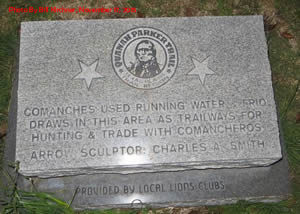
Shoot-Out on Jones Street
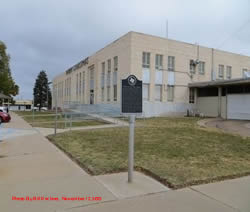 At an 1891 meeting to discuss the selection of a Castro County seat, words were exchanged between Ira Aten, a retired Texas Ranger speaking on behalf of Castro City, and Andrew McClelland, a spokesman for Dimmitt. The inflammatory remarks led to a gunfight between the two men on December 23, five days after Dimmitt was chosen county seat. In an exchange of shots in the middle of Jones Street, Aten wounded Andrew McClelland and his brother Hugh. Aten was acquitted of the assault charges and a short time later was appointed Castro County Sheriff.
At an 1891 meeting to discuss the selection of a Castro County seat, words were exchanged between Ira Aten, a retired Texas Ranger speaking on behalf of Castro City, and Andrew McClelland, a spokesman for Dimmitt. The inflammatory remarks led to a gunfight between the two men on December 23, five days after Dimmitt was chosen county seat. In an exchange of shots in the middle of Jones Street, Aten wounded Andrew McClelland and his brother Hugh. Aten was acquitted of the assault charges and a short time later was appointed Castro County Sheriff.Summerfield-Dameron Corner
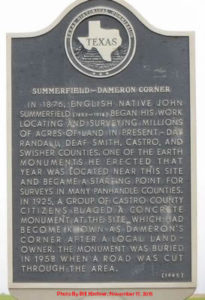
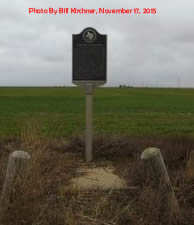 In 1876, English native John Summerfield (1885-1918) began his work locating and surveying millions of acres of land in present-day Randall, Deaf Smith, Castro and Swisher counties. One of the earth monuments he erected that year was located near this site and became a starting point for surveys in many Panhandle counties. In 1925, a group of Castro County citizens placed a concrete monument at the site, which had become known as Dameron’s Corner after a local landowner. The monument was buried in 1958 when a road was cut through the area.
In 1876, English native John Summerfield (1885-1918) began his work locating and surveying millions of acres of land in present-day Randall, Deaf Smith, Castro and Swisher counties. One of the earth monuments he erected that year was located near this site and became a starting point for surveys in many Panhandle counties. In 1925, a group of Castro County citizens placed a concrete monument at the site, which had become known as Dameron’s Corner after a local landowner. The monument was buried in 1958 when a road was cut through the area.
This is located 34° 32.417′ N, 102° 12.848′ W. Marker is near Dimmitt, Texas, in Castro County. Marker is at the intersection of State Highway 86 and Farm to Market Road 1567, on the left when traveling east on State Highway 86.

